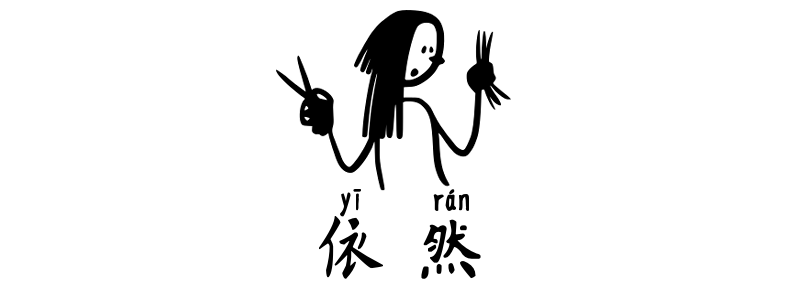Grammar Point:
依然 yīrán is a Chinese adverb that means “still,” “yet,” or “as before.” It’s used to indicate that a particular situation or condition remains unchanged despite the passage of time or other circumstances.
Structure
S + 依然 yīrán + V
媽媽雖然已經退休,她依然每天都在學新事物妈妈虽然已经退休,她依然每天都在学新事物
Even though my mother has retired, she still learns new things every day.
已經過了10年,但這份合約依然有效已经过了10年,但这份合约依然有效
It’s been 10 years, but this contract is still valid.
即使遇到挫折,他依然保持樂觀的態度即使遇到挫折,他依然保持乐观的态度
Despite facing setbacks, he maintains a positive attitude.
就算工作很忙,他依然會找出時間陪伴家人就算工作很忙,他依然会找出时间陪伴家人
Even with a busy job, he still manages to find time to spend with his family.
即使年紀漸長,他依然有著一顆開放的心即使年纪渐长,他依然有着一颗开放的心
Despite getting older, he still has an open mind.
S + 依然 yīrán + Adj
多年沒見,你依然那麼惹人厭多年没见,你依然那么惹人厌
Long time no see, you’re still as annoying as ever.
這地方依然和我記憶中的一樣美麗这地方依然和我记忆中的一样美丽
This place is still as beautiful as I remember it from years ago.
爸爸的想法從不改變,依然非常頑固爸爸的想法从不改变,依然非常顽固
Dad’s thoughts never change; he’s still very stubborn.
奶奶的身體依然和年輕時一樣健康奶奶的身体依然和年轻时一样健康
Grandma’s body is still as healthy as when she was young.
我以為換一個老師中文就會變簡單,但是依然很難我以为换一个老师中文就会变简单,但是依然很难
I thought changing to a different teacher would make Chinese easier, but it’s still difficult.
还 hái, 仍然 réngrán and 依然 yīrán
All three words, 还 hái, 仍然 réngrán, and 依然 yīrán, can be translated as “still” in English, but they are used in slightly different contexts and convey nuanced meanings:
还 hái: It can mean “still” in the sense of “yet” or “not yet.” It’s often used to indicate that a situation hasn’t changed up to a certain point in time. It’s more commonly used in questions or negative statements.
仍然 réngrán: It emphasizes the continuation of a situation, quality, or state that hasn’t changed despite expectations or circumstances. It’s often used to describe a consistent condition that remains over time. It’s also less colloquial than 还 hái.
依然 yīrán: 依然 yīrán is similar to 仍然 réngrán and also emphasizes the persistence of a situation or quality. However, it can sometimes carry a sense of “as before” or “in the same way as it has been. It’s also the most formal among these three.
Idiom
依然故我 yīrán gùwǒ
It can be translated as “to be one’s old self.” It implies that someone remains unchanged and continues to act as they always have. In a somewhat negative context, it can also mean “to be stuck in one’s ways,” suggesting that someone is resistant to change and refuses to adapt to new circumstances.
他之前因為酒駕出了車禍,本以為他會學到教訓,沒想到他依然故我他之前因为酒驾出了车祸,本以为他会学到教训,没想到他依然故我
He had a car accident due to drunk driving before, and I thought he would learn his lesson. However, he still remains unchanged.
大家都嘗試阻止他把錢拿去賭博,但他依然故我,最後輸得什麼也不剩大家都尝试阻止他把钱拿去赌博,但他依然故我,最后输得什么也不剩
Everyone tried to stop him from gambling away his money, but he remained stubborn, and in the end, he lost everything.
Practice
TouchHover over the space to see the answers.
✔️ The salary was like this 10 years ago, and it remains the same 10 years later.
10年前的薪水是這樣,10年後依然是這樣10年前的薪水是这样,10年后依然是这样
✔️ I didn’t know where my future was back then, and I still don’t know now.
我以前不知道自己的未來在哪裡,現在依然不知道我以前不知道自己的未来在哪里,现在依然不知道
✔️ I can’t afford a house now, and I still won’t be able to afford one after retirement.
我現在買不起房子,退休後依然也買不起房子我现在买不起房子,退休后依然也买不起房子
- “Still” in Chinese 1 – 还 hái (HSK 2)


